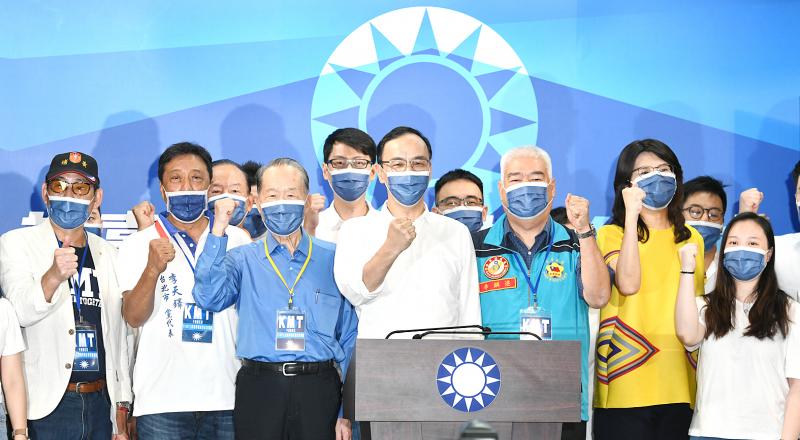Former Chinese Nationalist Party (KMT) chairman Eric Chu (朱立倫) yesterday formally registered to run for the party’s top job next month and outlined six goals if elected.
The KMT is scheduled to hold elections for its chairperson and National Congress delegates on Sept. 25, after they were postponed from July 24 due to a local COVID-19 outbreak in May.
Chu, who served two terms as New Taipei City mayor from December 2010 to December 2018, announced on Aug. 2 that he would join the race for KMT chairperson. He was the KMT chairman from January 2015 to January 2016, but resigned after losing the 2016 presidential election.

Photo: Liao Chen-huei, Taipei Times
At about 10am yesterday, Chu arrived at KMT headquarters in Taipei to complete his registration as candidate.
Chu said he holds six essential goals for the position, the top one being to win the local elections next year and bring the KMT back to power in 2024.
The second is to strengthen the KMT’s leadership, consolidate its power and make it more united, he said.
Third, the KMT should gain international respect and connect with countries around the world, he said.
Fourth, the KMT must play an essential role in cross-strait relations, he said, adding that the party should act as a stabilizing and peaceful force while reconnecting the two sides of the Taiwan Strait and restoring platforms for cross-strait exchange.
“Young people are our hope,” he said, describing his fifth goal for the KMT: to place greater emphasis on young people.
Chu’s sixth goal is that party reform must continue, he said, urging KMT members to pool resources into making the KMT better.
Registration for the chairperson election ends today.
Local media reports said that KMT Chairman Johnny Chiang (江啟臣), who in February announced that he would seek re-election, is expected to complete his registration today, along with former Taichung mayor Jason Hu (胡志強) and former KMT legislator Yen Kuan-heng (顏寬恒).
As a legislator, Chiang represents Taichung’s eighth electoral district, while Yen had represented the city’s second electoral district.

Taiwan has received more than US$70 million in royalties as of the end of last year from developing the F-16V jet as countries worldwide purchase or upgrade to this popular model, government and military officials said on Saturday. Taiwan funded the development of the F-16V jet and ended up the sole investor as other countries withdrew from the program. Now the F-16V is increasingly popular and countries must pay Taiwan a percentage in royalties when they purchase new F-16V aircraft or upgrade older F-16 models. The next five years are expected to be the peak for these royalties, with Taiwan potentially earning

STAY IN YOUR LANE: As the US and Israel attack Iran, the ministry has warned China not to overstep by including Taiwanese citizens in its evacuation orders The Ministry of Foreign Affairs (MOFA) yesterday rebuked a statement by China’s embassy in Israel that it would evacuate Taiwanese holders of Chinese travel documents from Israel amid the latter’s escalating conflict with Iran. Tensions have risen across the Middle East in the wake of US and Israeli airstrikes on Iran beginning Saturday. China subsequently issued an evacuation notice for its citizens. In a news release, the Chinese embassy in Israel said holders of “Taiwan compatriot permits (台胞證)” issued to Taiwanese nationals by Chinese authorities for travel to China — could register for evacuation to Egypt. In Taipei, the ministry yesterday said Taiwan

Taiwan is awaiting official notification from the US regarding the status of the Agreement on Reciprocal Trade (ART) after the US Supreme Court ruled US President Donald Trump's global tariffs unconstitutional. Speaking to reporters before a legislative hearing today, Premier Cho Jung-tai (卓榮泰) said that Taiwan's negotiation team remains focused on ensuring that the bilateral trade deal remains intact despite the legal challenge to Trump's tariff policy. "The US has pledged to notify its trade partners once the subsequent administrative and legal processes are finalized, and that certainly includes Taiwan," Cho said when asked about opposition parties’ doubts that the ART was

If China chose to invade Taiwan tomorrow, it would only have to sever three undersea fiber-optic cable clusters to cause a data blackout, Jason Hsu (許毓仁), a senior fellow at the Hudson Institute and former Chinese Nationalist Party (KMT) legislator, told a US security panel yesterday. In a Taiwan contingency, cable disruption would be one of the earliest preinvasion actions and the signal that escalation had begun, he said, adding that Taiwan’s current cable repair capabilities are insufficient. The US-China Economic and Security Review Commission (USCC) yesterday held a hearing on US-China Competition Under the Sea, with Hsu speaking on